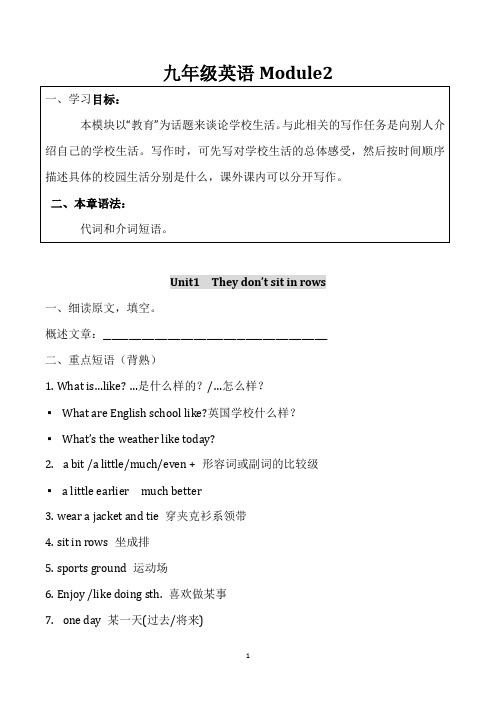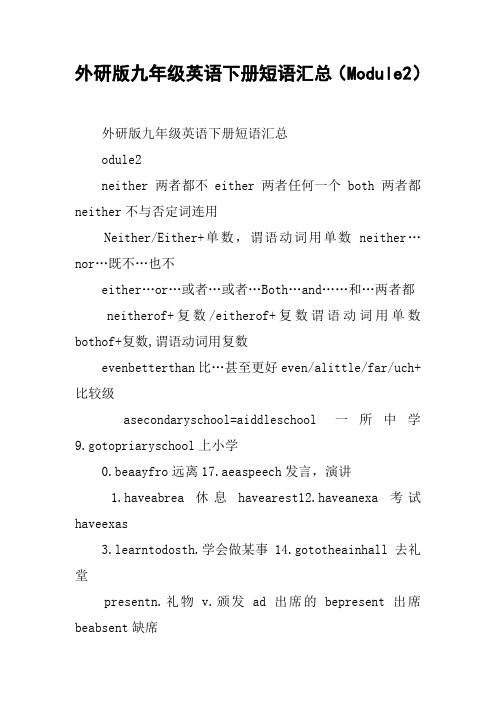外研社九年级下第二模块重点短语M2U1-2
- 格式:ppt
- 大小:165.50 KB
- 文档页数:5

葿外研版九年英下册短、重点句子和法芆九年英外研版(下)短、重点句子和法薁Module 1 Travel莂短 (Phrases):芈Unit 1莆by airplane 乘机羂departure lounge 候机螀time difference 差肇be full of 充 , 充 ......的 (表状 )蒅 be filled with用......充(表作)莃 have to 必,不得不蒂 in the UK在英国袆 because of 因(后接名或名短)薅 because 因(后接从句)螄 Spring Festival春羀 fly to=go to ⋯ by plane/on a plane 往衿 take a /the boat to⋯坐船去⋯⋯蚅 have quite a good/great/nice/wonderful/pleased time玩得很高羁 have a very good/great/nice/wonderful/pleased time玩得很高蚂同: have fun=enjoy oneself蚈 go sightseeing 去光螅似: go skating 去滑冰go swimming去游泳go shopping 物莂take a tour 旅行肀by coach 乘客莇the Summer Palace 和园螅go for a long walk 去散步螃had better do 最好做 ---袁at the end of 在⋯⋯末 /尽(后接)蒀by the end of 到⋯⋯止(后既可接又可接地点)袅plenty of 大量膃the school leavers’party 会艿take place 生膈 look forward to盼望,期待羅Unit 2薄with tears in one ’ s eyes 眼里含着泪水羁dream about 梦羇in front of 在 ---前面 (外部 )肅in the front of 在 ---前面(内部)蚁 set off 出,身葿似: set out 出,身set about 开始,着手set down 放下,写下set free 解放,放螆 set up 开,,立set to 毅然开始set on 突然攻,膄forget to do sth. 忘去做某事肂 forget doing sth.忘做某事膁 be unable to do 不能做 ---蝿at the start of 在 --- 的开端芄hold sb in one ’s arm 抱住某人蒃push sb away 推开虿write to sb. 写信某人薈as soon as 一 ---就 ---莄jump onto 跳到 ---上袄push past sb莁a pair of 一双 / /副表示的是成的西,是指两个不分开使用的西。
![[荐]外研版英语九年级下M2U1、2、3重点句子集锦-全考点](https://img.taocdn.com/s1/m/33f33a1dfab069dc51220181.png)
外研版英语九年级下M2U1、2、3重点句子集锦-全考点外研版新标准英语九下M2U1的主要内容是通过询问托尼的伦敦之行,引出关于中英学校之间的比较。
重点句子1.Did you enjoy yourself in London?你在伦敦玩得开心吗?enjoy oneself = have a good / nice / great / wonderful time = have fun 玩得开心2.What are English schools like? 英国学校怎么样?What’s...like?......怎么样?What’s her bike like?3.Let’s have a look. 让我们看一看。
have a look (at)...看一看......4.How many pupils are there in a class in England?英国一个班级有多少名学生?How many +可数名词复数+are there +介词短语?......有多少......?5.So our school is a bit bigger.所以我们的学校比较大一点。
a bit 有点+形容词/比较级;a bit of +不可数名词6.Every student wears school clothes in England.英国每个学生都穿校服。
wears school clothes穿校服7.And everyone is sitting around the tables in the classroom.每个人都在教室里围着桌子坐。
sit around the tables围着桌子坐8.They don't sit in rows. 他们不成排坐。
sit in rows成排坐9.Look at the swimming pool and the huge sports ground.看看游泳池和大操场。

九年级英语Module2Unit1 They don’t sit in rows 一、细读原文,填空。
概述文章:____________________________________________________二、重点短语(背熟)1.What is…like? …是什么样的?/…怎么样?▪What are English school like?英国学校什么样?▪What’s the weather like today?2. a bit /a little/much/even + 形容词或副词的比较级▪ a little earlier much better3.wear a jacket and tie 穿夹克衫系领带4.sit in rows 坐成排5.sports ground 运动场6.Enjoy /like doing sth. 喜欢做某事7.one day 某一天(过去/将来)8.Play with 和…玩9.mean doing sth. 意味着做某事mean to do sth. 打算/意图做某事= plan to do sth.◆1. tie 的用法(1)tie用作名词的基本意思是“领带,领结”。
▪I will give Jerry a tie as his birthday gift.我要送给杰瑞一条领带作为生日礼物。
(2)tie作动词时意思是“系,捆,扎,拴”,指用绳或带等打结将可能离开或移动的东西拴到某个固定的物体上。
▪Could you help me to tie my boots? 你能帮我系一下鞋带吗?◆2. row的用法row n. 一排,一行row是可数名词,多与介词of连用,指横向有秩序排成的一行。
▪On the farther side of the street there was a row of small shops. 街那头是一排小商店。

外研版九年级英语下册短语汇总(Module2)
外研版九年级英语下册短语汇总
odule2
neither两者都不either两者任何一个both两者都neither不与否定词连用
Neither/Either+单数,谓语动词用单数neither…nor…既不…也不
either…or…或者…或者…Both…and……和…两者都
neitherof+复数/eitherof+复数谓语动词用单数bothof+复数,谓语动词用复数
evenbetterthan比…甚至更好even/alittle/far/uch+比较级
asecondaryschool=aiddleschool一所中学9.gotopriaryschool上小学
0.beaayfro远离17.aeaspeech发言,演讲
1.haveabrea休息havearest1
2.haveanexa考试haveexas
3.learntodosth.学会做某事1
4.gototheainhall去礼堂
presentn.礼物v.颁发ad出席的bepresent出席beabsent缺席
passtheexa通过考试failtheexa考试失败
another+单数other+名词=otherssoe…others…one…theother…
0.havetoorelessons再上两节
1.thedangersofdrugsandsoing毒品和吸烟的危害性
2.aong三者或三者之间beteen两者之间与and连用2
3.parents’eeting家长会。

外研版九年级下册英语Module2重点单词短语、句型、语法汇总★重点单词1.i n s t e a d o f代替2.i n r o w s一排排地3.t a l k a b o u t谈论4.p a r e n t s'm e e t i n g家长会5.a t l e a s t至少6.a f e w一些7.s u c h a s比如8.h a v e a b r e a k休息一下9.a b o v e a l l尤其是10.b e c a u s e o f由于★核心句型1.e n j o y d o i n g s t h喜欢做某事2.H e r e a r e ...这里有……★语法点击代词一、人称代词及物主代词◆人称代词包括主格和宾格。
主格在句中作主语,宾格在句中作动词或介词的宾语。
◆形容词性物主代词后必须接名词,名词性物主代词可单独作主语、宾语和表语,其后不再跟名词。
二、反身代词反身代词常在句中作宾语,表语,同位语。
反身代词还和一些动词或介词构成固定搭配,如:e n j o y o n e s e l f,t e a c h o n e s e l f,b y o n e s e l f 等。
三、不定代词◆ b o t h和a l l表示肯定意义,b o t h表示“两者都”,a l l表示“三者或三者以上都”;e i t h e r表示“(两者之中)任何一个”。
n e i t h e r和n o n e表示否定意义,n e i t h e r表示“两者都不”,n o n e表示“三者或三者以上都不”。
◆ f e w和a f e w指代可数名词复数,a f e w表示肯定意义,f e w表示否定意义。
a l i t t l e和l i t t l e指代不可数名词,a l i t t l e表示肯定意义,l i t t l e表示否定意义。
◆s o m e通常用于肯定句中,a n y通常用于否定句和疑问句中,但在表示请求和建议的疑问句中,如果希望得到肯定回答,常用s o me 而不用a n y。

Module 2 Education知识梳理知识点一重点单词与短语重点单词ours,tie,row,pool pass,secondary,absent,bell重点短语have a look,a bit,sit around,play with,secondary school,away from,from...to...,tell about,have exams,talk about,what about,do well in,ask for,so many,be able to,ask...to do...知识点二重点句子1.Did you enjoy yourself in London?2.So ours is a bit bigger.3.They don't sit in rows.4.I hope I can visit Susie's school one day.5.It looks really great.6.If I pass my exams next year,I'll stay here until I'm eighteen.7.River School is a secondary school,about twenty minutes away from my home by bike.8.We go to school every weekday from 8:45 am to 3:15 pm.9.In the afternoon,we have two more lessons before school finishes.10.We have a large sports ground for football and tennis,where we can play both during and after school hours.11.I got good marks in both maths and geography.12.I've still got a few days before I have to decide.13.A friend of mine called Mark also loves this subject and sometimes we lend each other books or DVDs about history.知识点三重点语法Grammar 1:代词代词有人称代词、指示代词、物主代词、反身代词、不定代词和疑问代词等。
中考英语:外研版九年级下册英语重点短语句型用法(Unit1-2) Unit1 We toured the city by bus and by taxi.1. welcome back 欢迎回来2. not bad 还不错3. be full of 充满=be filled with4. over = more than 超过、多于5. because of + 名词/代词/动名词because+句子6. fly back to +地名飞回某地7. a bit late 有点晚a bit of + 不可数名词8. fly direct to Hong Kong 直飞香港9. succeed in doing sth. 成功做某事10. take a boat to sp. = go to sp. by boat 坐船去某地11. have quite a good time 玩得很高兴quite a / an + adj. + n. = a very adj. + n.quite a nice boy = a very nice boy12. tour the city v.= take a tour to the city n. 环城市旅行13. go for a walk 去散步14. had better do sth. 最好做某事15. at the end of the term 在学期末16. nothing to worry about 没什么可担心的17. as long as 只要; 和…一样长18. the school-leavers’ party 毕业生晚会19. look forward to+ sth. / doing sth. 盼望(做)某事Unit2 It’s a long story.1. say goodbye to sb. 向某人告别say hello to sb. 向某人问候2. take care 多保重care for 喜欢care about 关心take care = be careful 小心、注意take care of sb. / sth. 照顾某人/ 保管某物3. get on 上(车)get off 下(车)4. be afraid +that从句: 恐怕be afraid of +名词/代词/动名词: 害怕/担心be afraid to do sth. 害怕做某事5. take one’s seat 就坐;坐某人的座位6. have /get sth. ready: 把某物准备好Please have your tickets ready. 请把票准备好。
外研版九年级下英语各单元要点总结Unit 1: Vacation Time
- 表达假期打算和计划
- 询问他人的假期计划
- 谈论不同假期活动和景点
Unit 2: Life Online
- 讨论网络对生活的影响
- 探讨网络安全问题
- 研究使用不同的网络服务和应用
Unit 3: Travelling with Friends
- 描述旅行经历和感受
- 研究旅行时的礼仪和注意事项
- 讨论旅行中的困难和解决方法
Unit 4: Discovering the Universe
- 研究关于宇宙的知识
- 讨论宇宙中的现象和事件
- 探索未来的太空探索计划
Unit 5: Great Inventions
- 研究有关重要发明的历史和背景
- 分析发明对社会的影响
- 讨论未来可能的重大发明
Unit 6: Wonderful Wildlife
- 研究有关保护野生动物的知识
- 探讨野生动物及其栖息地的问题
- 了解野生动物保护的重要性
Unit 7: Cultural Heritage
- 研究各种文化遗产和传统俗
- 分析文化遗产对社会的重要性
- 探讨如何保护和传承文化遗产
Unit 8: Healthy Lifestyle
- 介绍保持健康的重要性
- 讨论不同的健康生活方式
- 研究如何保持身体和心理健康
Unit 9: Taking Action
- 研究社会问题和环保行动
- 分析社会问题的原因和解决方法
- 探讨如何积极参与社会行动
以上是外研版九年级下英语各单元的要点总结。
Module2Unit1cate(动/及)“教育”用法:educate sb to do sth“教育某人做某事”education(名/可)“教育”短语:get an education“受到教育”educator(名/可)“教育家”(形)educated“受过教育的”educational“有教育意义的”2.row(动/名)(名/可)(1)“排”例:They don't sit in rows.(2)“划船”短语:go for a row(动/不及)“划船”短语:go rowing3.What do you like best about···“关于学校,你最喜欢什么?”4.go to lessons“上课”5.let's have a look6.英语中,表“穿”强调动作:(1)put on“穿上(强调穿的动作,后接衣、帽、鞋…)”(2)dress(动/及)“给…穿衣(宾语常是人)”①dress oneself=get dressed“给自己穿衣服”②be dressed in“穿着…(表状态)”③dress up“盛装打扮”表状态,译为“穿着”(1)wear“表状态、宾语可以是衣帽,也可是饰物,奖章等”(2)have sth on“穿着”=be wearing(3)sb be in+表衣服,颜色,强调款式(定、表)(4)sth be on+sb7.tie(动/名)(名)“领带,鞋带”(动/及)“捆,绑,系”短语:tie sth up“把···捆起来”8.mean(动/及)(1)“意味着,意思是”①mean sth“意思是”②mean doing sth“意味着做…”③It means+that从句“意思是…,意味着…”(2)“指的是…”(3)“打算”mean to do sth“打算做某事”meaning(名)“含义”(1)has meaning to do“对某人有含义”(2)“…是什么意思”What dose…mean?=What do you mean by…?=What’s the meaning of…means(名/可)“方式,方法”(单复同形)短语:one meanstwo meansin this way=by this means“用这种方法”meaningful(形)“有意义的,意味深长的”9.number of pupils in the school“在校学生数量”number of pupil in a class“班级学生数量”arrangement of seat in the classroom“教室中座位的排列”sports areas“运动区”10.arrange(动/及/不及)(1)“排列,整理”(2)“安排”句型:①arrange to do sth“安排做某事”例:I have arranged to see them tonight.②arrange for sb to do sth“安排某人做某事”③arrange for“安排,准备···”Have you arranged for the meeting?arrangement(名/可/不可)“安排,布置”短语:come to an arrangement“谈妥,达成协议”make arrangement for“为···做好准备”make arrangement with···“与(某人)商定或约好”Module21.how long···“多长时间”答语:for+段时间since+点时间st((动/名/形/副)(动/不及)“持续,继续”用法:last for+段时间“持续···(时间)”→(肯定句中,for可省)例:The operation lasted(for)four hours.(形)(1)“最后的,末尾的”(2)“刚刚过去的”(3)“最不可能的,最不合适的”(副)(1)“最后”例:I came last in the competition.“我比赛得了最后一名”(2)“上次,最近”例:I last saw him in New York two years ago.(名)“最后”用法:last for“持续,维持”at last“最后,终于”to the last“到最后”have the last word“最终决定,最后裁决”in the last few years“在过去的几年里”last but one“倒数第二”lasting(形)“持久的”lastly(副)“最后(一点)”3.“你觉得···怎么样?”How do you like···?=What do you think of···?4.my school life5.pass(动/名)(动)(及)(1)“路过,经过”用法:pass+地点/某人=不及物动词+past+地点/某人=不及物动词+by+地点/某人例:She passed me.(2)“传递”=hand用法:①pass sb sth=pass sth to sb“把某物递给某人”②pass sth on to sb“把某物递给某人”(强调不是一次性,持续地传下去)例:I passed the stick on to Jim.(3)“及格”例:pass the exam(不及)(1)“路过,经过”(常与by连用,后无地点)例:A car passed by.(2)“(时间)过去,流逝”例:A year passed quickly.(名/可)“及格”例:a pass mark“及格分数”6.exam名/可)“考试”=examination用法:(1)take exams=do exams(2)pass the exam(3)fail an exam=fail in an exam辨析:exam:通常指正式的考试,如期末考试,入学考试等test:指小测试,小测验quiz:指事先无准备,随时进行的问答与测试,也指电视节目中的知识竞赛7.next year“明年”指现在之后的下一年the next year“第二年”指过去或将来某一年之后的下一年8.secondary(形)(1)“次要的,第二位的”(2)“(教育)中等的,中级的”书:a secondary school9.school(名/可)“学校”短语:go to school“去上学”go to the school“去学校”at school“在学校,在上学”after school“放学后”leave school“毕业”“放学”school term“学年”after-school(形)“课外的,放学后的”10.absent(形)(1)“缺席的”反:present“出席的”用法:be absent from“缺席”例:He is absent from the meeting.(2)“心不在焉的”→作定语11.the main hall12.head teacher13.bell(名/可)(1)“铃”(2)“钟”(3)“门铃”14.break(动/名)(动/及)(1)“弄坏,折断”书:break anything“打破任何东西”(2)“违反”词组:break the rules(3)“打破(记录)”词组:break the record(不及)“休息,中断”(名/可)“休息,中断”have a break=take a breakbroken(形)“坏了的”15.“在原有的基础上,再多加几个···”数词+more+名词=another+数词+名词16.instead(副)代替,取而代之→句首、句尾instead of而不是→句中,后加:名词、代词宾格、介词短语、doing 例:I wanted to be a cook,I became a actor instead.=I became a actor instead of a cook.16.instead of与rather than译为“而不是”(1)instead of+宾格rather than+宾格或主格(2)instead of+doing rather than+do(3)instead of+介词短语rather than+介词短语17.social(形)(1)“社会的”例:a social problem(2)“社交的”例:a social circlesociety(名/可)(1)“社会”(2)“社团”例:language societies18.a sports day19.once a term20.a parents meeting21.make progress in···“”在···方面取得进步。